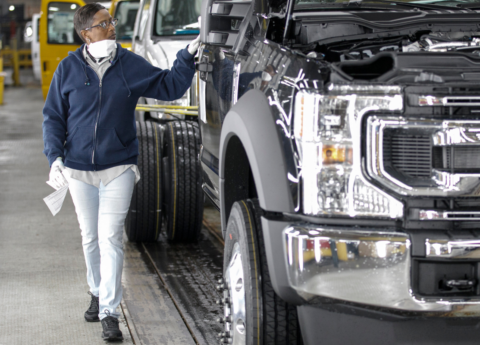Nearly 100 years after President Franklin Roosevelt called child labor an “ancient atrocity” and took action to abolish it, the scourge of exploiting kids through work is back. Corporate violations for unlawful child labor have soared over the last few years in Kentucky, and 14 state legislatures recently introduced or passed laws to weaken child labor standards. Kentucky should reject this trend by strengthening child protections and doing more to help all kids get the childhood they deserve.
Recent increase in child labor violations in the commonwealth
Kentucky recently made national news for the discovery that two 10-year-old children were working at a McDonald’s in Louisville. It was part of a Department of Labor (DOL) investigation that found 62 McDonald’s locations across Kentucky and three other states that were illegally employing 305 children. Along with underage work, these employers were working older kids more hours than allowed and assigning them dangerous tasks like operating deep fryers.
The recent DOL violations are part of a growing trend. The number of federal child labor violations in Kentucky rose from 73 between 2015 and 2018 to 948 between 2019 and 2022. Nearly three-fourths of the violations since 2004 have occurred in just the last four years. Kentucky is not alone. Nationally, the number of minors illegally employed increased 283% between 2015 and 2022, and rose 37% since 2021 alone.

Fast food restaurants are by far the most common violators of child labor protections in Kentucky. Since 2004, Wendy’s restaurants in the state have racked up 465 violations, McDonald’s 227 and Popeyes 116. Other significant scofflaws were Culver’s (31), Subway (28), Zaxby’s (24) and Chick-fil-A (13). In addition, seven country clubs, six gas stations and 37 full-service restaurants have been caught violating child labor laws, along with a funeral home, private security firm and other businesses.
Due to underfunding of enforcement, it’s likely there are many more violators that not being caught. A recent CBS News “60 Minutes” report described how a cleaning contractor for Tyson Foods, Cargill and other slaughterhouses was caught employing 102 children as young as 13 years old across eight states. This abuse became public only after a teacher reported seeing a student with acid burns. When asked if their investigation uncovered the full extent of the problem with just that one company, the DOL inspector told “60 Minutes,” “Not at all. I believe that the number is much higher.”
As the Economic Policy Institute (EPI) reports, migrant youth are “particularly vulnerable to exploitation by employers and networks of labor brokers and staffing agencies who recruit workers on their behalf.” Many of these children are unaccompanied and have fled violence and poverty in their native countries. Due to a broken immigration system, they are on long waiting lists for asylum protection, making them ineligible for work authorization and struggling under desperate living conditions.
Some states are imperiling kids by rolling back already inadequate child labor protections
A national right-wing think tank called the Foundation for Government Accountability – which has been behind attacks on food, health and unemployment assistance in Kentucky – is leading the effort to roll back state child labor laws. Allies include the Koch brothers-funded Americans for Prosperity and state industry associations in search of cheap and compliant workers.
Proponents seek to eliminate state work permits that exist in 35 states, which help inspectors better monitor conditions for children who are legally working. They also aim to extend work hours, lower minimum ages and lift restrictions on hazardous work. A total of 14 states have introduced or passed laws rolling back child labor protections just in the last couple of years, including especially harmful bills that became law in Iowa and Arkansas.
Kentucky does not mandate a child work permit, only requiring those 16- and 17-year-olds that want to work more than 30 hours a week during the school year to get written parental permission and a school certification of at least a 2.0 grade point average. During the school year, Kentucky law allows children who are 14 and 15 years old to work up to 18 hours a week without such a permit, including three hours on a school day; they can work 40 hours a week in the summer.
Kentucky is also one of the worst states in the nation for child agricultural employment protections, with no minimum working age or maximum limits on hours or days a week to work.
Kentucky should protect kids and families
As EPI outlines, the federal government has an important role to play in setting nationwide standards, especially given its unique role in immigration law. EPI points to the need to fully fund workplace law enforcement, eliminate the disparate treatment of farm workers under federal statutes, modernize labor law to better support the right to organize unions, and fix immigration including by providing a path to citizenship for unauthorized immigrants and eliminating the backlog in asylum applications.
But states also have actions they should take. Instead of pushing kids into low-wage and often dangerous employment, Kentucky should do more to ensure they complete their education and have access to health care and other benefits. The state should also increase family supports including by raising the outdated minimum wage and creating a state-level child tax credit to make it less likely families will look to child employment out of desperation.
And instead of weakening our laws that protect children, Kentucky should strengthen existing standards through actions that:
- Mandate work permits with age certification for all employed minors in order to allow greater monitoring. To ensure parental involvement and rights, require that the permits be signed by a parent or guardian. Also include certification by the child’s school and – as with 16- and 17-year-olds now that want to work more than 30 hours a week – include revocation of a permit if a student fails to achieve a successful grade point average.
- Increase state funding for workplace enforcement capacity.
- Address the state exemptions that fail to protect minors from dangerous and excessive agricultural employment, and fully align the state definition of hazardous occupations and jobs prohibited for 14- and 15 year-olds with the federal definition.
- Support the ability of workers to protect kids by expanding labor rights, including by repealing the right-to-work law like recently occurred in Michigan.




